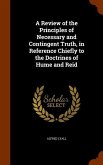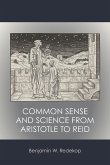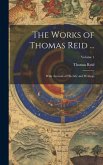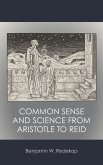James Van Cleve
Problems from Reid
James Van Cleve
Problems from Reid
- Gebundenes Buch
- Merkliste
- Auf die Merkliste
- Bewerten Bewerten
- Teilen
- Produkt teilen
- Produkterinnerung
- Produkterinnerung
In this systematic study, James Van Cleve expounds Thomas Reid's positions and arguments on topics in the philosophy of perception, knowledge, and action, taking interpretive stands on points where his meaning is disputed and assessing the extent to which his ideas make valuable contributions to issues philosophers are discussing today.
Andere Kunden interessierten sich auch für
![A Review of the Principles of Necessary and Contingent Truth, in Reference Chiefly to the Doctrines of Hume and Reid A Review of the Principles of Necessary and Contingent Truth, in Reference Chiefly to the Doctrines of Hume and Reid]() Alfred LyallA Review of the Principles of Necessary and Contingent Truth, in Reference Chiefly to the Doctrines of Hume and Reid48,99 €
Alfred LyallA Review of the Principles of Necessary and Contingent Truth, in Reference Chiefly to the Doctrines of Hume and Reid48,99 €![Common Sense and Science from Aristotle to Reid Common Sense and Science from Aristotle to Reid]() Benjamin W. RedekopCommon Sense and Science from Aristotle to Reid52,99 €
Benjamin W. RedekopCommon Sense and Science from Aristotle to Reid52,99 €![The Works of Thomas Reid ...: With Account of His Life and Writings; Volume 1 The Works of Thomas Reid ...: With Account of His Life and Writings; Volume 1]() Thomas ReidThe Works of Thomas Reid ...: With Account of His Life and Writings; Volume 145,99 €
Thomas ReidThe Works of Thomas Reid ...: With Account of His Life and Writings; Volume 145,99 €![Thomas Reid and Scepticism Thomas Reid and Scepticism]() Philip De BaryThomas Reid and Scepticism202,99 €
Philip De BaryThomas Reid and Scepticism202,99 €![New Essays on Thomas Reid New Essays on Thomas Reid]() New Essays on Thomas Reid238,99 €
New Essays on Thomas Reid238,99 €![Common Sense and Science from Aristotle to Reid Common Sense and Science from Aristotle to Reid]() Benjamin W. RedekopCommon Sense and Science from Aristotle to Reid151,99 €
Benjamin W. RedekopCommon Sense and Science from Aristotle to Reid151,99 €![The Works of Thomas Reid ... With an Account of His Life and Writings The Works of Thomas Reid ... With an Account of His Life and Writings]() Thomas ReidThe Works of Thomas Reid ... With an Account of His Life and Writings43,99 €
Thomas ReidThe Works of Thomas Reid ... With an Account of His Life and Writings43,99 €-
-
-
In this systematic study, James Van Cleve expounds Thomas Reid's positions and arguments on topics in the philosophy of perception, knowledge, and action, taking interpretive stands on points where his meaning is disputed and assessing the extent to which his ideas make valuable contributions to issues philosophers are discussing today.
Hinweis: Dieser Artikel kann nur an eine deutsche Lieferadresse ausgeliefert werden.
Hinweis: Dieser Artikel kann nur an eine deutsche Lieferadresse ausgeliefert werden.
Produktdetails
- Produktdetails
- Verlag: Hurst & Co.
- Seitenzahl: 568
- Erscheinungstermin: 1. September 2015
- Englisch
- Abmessung: 239mm x 168mm x 43mm
- Gewicht: 885g
- ISBN-13: 9780199857036
- ISBN-10: 0199857032
- Artikelnr.: 47871240
- Herstellerkennzeichnung
- Produktsicherheitsverantwortliche/r
- Europaallee 1
- 36244 Bad Hersfeld
- gpsr@libri.de
- Verlag: Hurst & Co.
- Seitenzahl: 568
- Erscheinungstermin: 1. September 2015
- Englisch
- Abmessung: 239mm x 168mm x 43mm
- Gewicht: 885g
- ISBN-13: 9780199857036
- ISBN-10: 0199857032
- Artikelnr.: 47871240
- Herstellerkennzeichnung
- Produktsicherheitsverantwortliche/r
- Europaallee 1
- 36244 Bad Hersfeld
- gpsr@libri.de
James Van Cleve is Professor of Philosophy at the University of Southern California, having moved there in 2005 after teaching for many years at Brown University. He is the author of Problems from Kant (OUP, 1999) as well as over forty-five articles in epistemology and metaphysics.
* Acknowledgments
* Introduction
* Chapter 1: Sensation and Perception
* A. Explanations of Terms
* B. Sensation versus Perception
* C. Reid's Threefold Account of Perception
* D The Conception in Perception
* E. Perception and Belief
* F. Consciousness and Attention
* G. Are Sensations Self-Reflexive?
* Chapter 2: Reid's Nativism
* A. Reid's Nativism
* B. Natural Signs
* C. The Experimentum Crucis
* D. Responses to the Experimentum Crucis
* E. Woulds, Coulds, or Shoulds?
* F. Nativism as an Antidote to Skepticism?
* Chapter 3: Direct Realism Versus the Way of Ideas
* A. The Way of Ideas
* B. First Argument for the Way of Ideas: No Action at a Distance
* C. Second Argument for the Way of Ideas: Hume's Table Argument
* D. Third Argument for the Way of Ideas: Double Vision
* E. Fourth Argument for the Way of Ideas: Malebranche's Master
Argument
* F. Three Forms of Direct Realism
* G. Do Sensations Obstruct Direct Realism?
* H. Is Reid a Presentational Direct Realist?
* I. All Perception is Direct Perception
* Chapter 4: Primary and Secondary Qualities
* A. Reid's Relation to Locke and Berkeley
* B. The Real Foundation: Epistemological or Metaphysical?
* C. Dispositions or Bases?
* D. Intrinsic or Extrinsic?
* E. Fixed or Variable?
* F. Four Views that Conflict with Reid's
* Chapter 5: Acquired Perception
* A. The Mechanics of Acquired Perception
* B. Is Acquired Perception Really Perception?
* C. Are Secondary Qualities Objects of Acquired Perception Only?
* D. Does Acquired Perception Alter the Content of our Original
Perceptions?
* E. Could Anything Become an Object of Acquired Perception?
* F. Is Reid Inconsistent about the Requisites of Perception?
* Chapter 6: The Geometry of Visibles
* A. The Properties of Spherical Figures
* B. Depth is Not Perceived
* C. The Argument from Indistinguishability
* D. Visibles as Sense Data
* E. Coincidence as Identity
* F. Angell's Approach
* G. The Argument of Paragraph 4
* H. The Real Basis of the Geometry of Visibles
* I. Does the Geometry of Visibles Jeopardize Direct Realism?
* J. What Are Visibles?
* K. Direct Realism and Seeing What we Touch
* L. Visible Figure as a Relativized Property of Ordinary Objects
* M. Mediated but Direct?
* Chapter 7: Erect and Inverted Vision
* A. The Naïve Puzzle and Rock's Question
* B. The Classical Solution
* C. Berkeley's Solution(s) to the Naïve Puzzle
* D. Reid's Alternative to Berkeley's Solution
* E. Answers to Rock's Question
* F. Experiments with Inverting Lenses
* G. Perceptual Adaptation
* Chapter 8: Molyneux's Question
* A. Molyneux's Question
* B. Empirical Evidence
* C. Berkeley's Answer
* D. Reid's answer(s)
* E. Is Berkeley's Modus Tollens Reid's Modus Ponens?
* F. The One-Two Molyneux Question
* G. Concluding Confession
* Chapter 9: Memory and Personal Identity
* A. Things Obvious and Certain with Regard to Memory
* B. Critique of the Impression and Idea Theories of Memory
* C. Memory as Direct Awareness of Things Past
* D. The Specious Present
* E. Personal Identity
* Chapter 10: Conception and its Objects
* A. Was Reid a Meinongian before Meinong?
* B. Alternatives to Meinongism: Ideas and Universals
* C. Alternatives to Meinongism: The Adverbial Theory of Thinking
* D. A Meinongian Defense of Direct Realism
* E. Assessment of the Defense
* F. Direct Realism Redux
* Chapter 11: Epistemology 1: First Principles
* A. First Principles and Epistemic Principles
* B. A Crucial Ambiguity
* C. Clues from Reid's Discussion of Descartes
* D. Particulars Versus Generals
* E. Three Reasons for Particularism
* F. Other Minds and Natural Signs
* G. Must Principles Be General?
* H. Establishing Reliability Without Circularity
* I. Reid on Confirming the Testimony of our Faculties
* J. Can Epistemic Principles Be First Principles?
* K. The Epistemic Status of Reliability Principles
* L. Conclusion
* Chapter 12: Epistemology 2: Reid's Response to the Skeptic
* A. Direct Realism
* B. Naturalism
* C. Externalism
* D. Problems for Externalism
* E. Rationalist Alternatives
* F. Conclusion
* Chapter 13: Epistemology 3: Lehrer's Reid
* A. Must a Knower Know that his Faculties are Reliable?
* B. A Special Role for Principle 7?
* C. Faculties that Vouch for Themselves?
* Chapter 14: Theory of Action 1: Causation, Action, and Volition
* A. The Notion of Active Power
* B. Two Types of Causation
* C. Universal Agent Causation
* D. Action and Volition
* Chapter 15: Theory of Action 2: Determinism, Freedom, and Agency
* A. Two Forms of Determinism
* B. What Freedom is not: the Williwig Account
* C. What Freedom is: the Agent-Causation Account
* D. The Fundamental Dilemma for Libertarianism
* E. The Regress of Exertion
* F. The Regress of Agent Causation
* G. Anomic Explanation
* Chapter 16: Reid versus Hume on Morals
* A. Hume and Reid in the Broad Scheme of Things
* B. Reid against Hume
* C. Hume against Reid
* D. Ethics and Epistemology
* Appendices
* A. Is There Knowledge by Acquaintance?
* B. Conception and Judgment: the Chicken or the Egg?
* C. Experience as a Source of Concepts
* D. Perception as Analog Representation
* E. Byrne versus Reid
* F. Infinity and Reflexivity
* G. Externality and Extension
* H. Programming the Obvious
* I. The Sun in the Sky and the Sun in my Mind
* J. Secondary Qualities: Can We Have it Both Ways?
* K. The One-Point Argument
* L. Stereo Sue
* M. Hyperbolic Claims about Hyperbolic Geometry
* N. What Is Special about the Sphere?
* O. Is Reid's Geometry Imaginable?
* P. Forlorn Reflections
* Q. Ask Marilyn
* R. Stratton Overturned
* S. Molyneux's Question Answered after 300 Years?
* T. Relative Identity
* U. Locke, Berkeley, Hume, and Reid on Abstract Ideas
* V. The First Principles of Contingent Truths
* W. Reid on the First Principle(s) of Descartes
* X. Rowe's Regress
* Y. Volition and Undertaking
* Z. Reid, Chisholm, Taylor, and Ginet
* Bibliography
* Index
* Introduction
* Chapter 1: Sensation and Perception
* A. Explanations of Terms
* B. Sensation versus Perception
* C. Reid's Threefold Account of Perception
* D The Conception in Perception
* E. Perception and Belief
* F. Consciousness and Attention
* G. Are Sensations Self-Reflexive?
* Chapter 2: Reid's Nativism
* A. Reid's Nativism
* B. Natural Signs
* C. The Experimentum Crucis
* D. Responses to the Experimentum Crucis
* E. Woulds, Coulds, or Shoulds?
* F. Nativism as an Antidote to Skepticism?
* Chapter 3: Direct Realism Versus the Way of Ideas
* A. The Way of Ideas
* B. First Argument for the Way of Ideas: No Action at a Distance
* C. Second Argument for the Way of Ideas: Hume's Table Argument
* D. Third Argument for the Way of Ideas: Double Vision
* E. Fourth Argument for the Way of Ideas: Malebranche's Master
Argument
* F. Three Forms of Direct Realism
* G. Do Sensations Obstruct Direct Realism?
* H. Is Reid a Presentational Direct Realist?
* I. All Perception is Direct Perception
* Chapter 4: Primary and Secondary Qualities
* A. Reid's Relation to Locke and Berkeley
* B. The Real Foundation: Epistemological or Metaphysical?
* C. Dispositions or Bases?
* D. Intrinsic or Extrinsic?
* E. Fixed or Variable?
* F. Four Views that Conflict with Reid's
* Chapter 5: Acquired Perception
* A. The Mechanics of Acquired Perception
* B. Is Acquired Perception Really Perception?
* C. Are Secondary Qualities Objects of Acquired Perception Only?
* D. Does Acquired Perception Alter the Content of our Original
Perceptions?
* E. Could Anything Become an Object of Acquired Perception?
* F. Is Reid Inconsistent about the Requisites of Perception?
* Chapter 6: The Geometry of Visibles
* A. The Properties of Spherical Figures
* B. Depth is Not Perceived
* C. The Argument from Indistinguishability
* D. Visibles as Sense Data
* E. Coincidence as Identity
* F. Angell's Approach
* G. The Argument of Paragraph 4
* H. The Real Basis of the Geometry of Visibles
* I. Does the Geometry of Visibles Jeopardize Direct Realism?
* J. What Are Visibles?
* K. Direct Realism and Seeing What we Touch
* L. Visible Figure as a Relativized Property of Ordinary Objects
* M. Mediated but Direct?
* Chapter 7: Erect and Inverted Vision
* A. The Naïve Puzzle and Rock's Question
* B. The Classical Solution
* C. Berkeley's Solution(s) to the Naïve Puzzle
* D. Reid's Alternative to Berkeley's Solution
* E. Answers to Rock's Question
* F. Experiments with Inverting Lenses
* G. Perceptual Adaptation
* Chapter 8: Molyneux's Question
* A. Molyneux's Question
* B. Empirical Evidence
* C. Berkeley's Answer
* D. Reid's answer(s)
* E. Is Berkeley's Modus Tollens Reid's Modus Ponens?
* F. The One-Two Molyneux Question
* G. Concluding Confession
* Chapter 9: Memory and Personal Identity
* A. Things Obvious and Certain with Regard to Memory
* B. Critique of the Impression and Idea Theories of Memory
* C. Memory as Direct Awareness of Things Past
* D. The Specious Present
* E. Personal Identity
* Chapter 10: Conception and its Objects
* A. Was Reid a Meinongian before Meinong?
* B. Alternatives to Meinongism: Ideas and Universals
* C. Alternatives to Meinongism: The Adverbial Theory of Thinking
* D. A Meinongian Defense of Direct Realism
* E. Assessment of the Defense
* F. Direct Realism Redux
* Chapter 11: Epistemology 1: First Principles
* A. First Principles and Epistemic Principles
* B. A Crucial Ambiguity
* C. Clues from Reid's Discussion of Descartes
* D. Particulars Versus Generals
* E. Three Reasons for Particularism
* F. Other Minds and Natural Signs
* G. Must Principles Be General?
* H. Establishing Reliability Without Circularity
* I. Reid on Confirming the Testimony of our Faculties
* J. Can Epistemic Principles Be First Principles?
* K. The Epistemic Status of Reliability Principles
* L. Conclusion
* Chapter 12: Epistemology 2: Reid's Response to the Skeptic
* A. Direct Realism
* B. Naturalism
* C. Externalism
* D. Problems for Externalism
* E. Rationalist Alternatives
* F. Conclusion
* Chapter 13: Epistemology 3: Lehrer's Reid
* A. Must a Knower Know that his Faculties are Reliable?
* B. A Special Role for Principle 7?
* C. Faculties that Vouch for Themselves?
* Chapter 14: Theory of Action 1: Causation, Action, and Volition
* A. The Notion of Active Power
* B. Two Types of Causation
* C. Universal Agent Causation
* D. Action and Volition
* Chapter 15: Theory of Action 2: Determinism, Freedom, and Agency
* A. Two Forms of Determinism
* B. What Freedom is not: the Williwig Account
* C. What Freedom is: the Agent-Causation Account
* D. The Fundamental Dilemma for Libertarianism
* E. The Regress of Exertion
* F. The Regress of Agent Causation
* G. Anomic Explanation
* Chapter 16: Reid versus Hume on Morals
* A. Hume and Reid in the Broad Scheme of Things
* B. Reid against Hume
* C. Hume against Reid
* D. Ethics and Epistemology
* Appendices
* A. Is There Knowledge by Acquaintance?
* B. Conception and Judgment: the Chicken or the Egg?
* C. Experience as a Source of Concepts
* D. Perception as Analog Representation
* E. Byrne versus Reid
* F. Infinity and Reflexivity
* G. Externality and Extension
* H. Programming the Obvious
* I. The Sun in the Sky and the Sun in my Mind
* J. Secondary Qualities: Can We Have it Both Ways?
* K. The One-Point Argument
* L. Stereo Sue
* M. Hyperbolic Claims about Hyperbolic Geometry
* N. What Is Special about the Sphere?
* O. Is Reid's Geometry Imaginable?
* P. Forlorn Reflections
* Q. Ask Marilyn
* R. Stratton Overturned
* S. Molyneux's Question Answered after 300 Years?
* T. Relative Identity
* U. Locke, Berkeley, Hume, and Reid on Abstract Ideas
* V. The First Principles of Contingent Truths
* W. Reid on the First Principle(s) of Descartes
* X. Rowe's Regress
* Y. Volition and Undertaking
* Z. Reid, Chisholm, Taylor, and Ginet
* Bibliography
* Index
* Acknowledgments
* Introduction
* Chapter 1: Sensation and Perception
* A. Explanations of Terms
* B. Sensation versus Perception
* C. Reid's Threefold Account of Perception
* D The Conception in Perception
* E. Perception and Belief
* F. Consciousness and Attention
* G. Are Sensations Self-Reflexive?
* Chapter 2: Reid's Nativism
* A. Reid's Nativism
* B. Natural Signs
* C. The Experimentum Crucis
* D. Responses to the Experimentum Crucis
* E. Woulds, Coulds, or Shoulds?
* F. Nativism as an Antidote to Skepticism?
* Chapter 3: Direct Realism Versus the Way of Ideas
* A. The Way of Ideas
* B. First Argument for the Way of Ideas: No Action at a Distance
* C. Second Argument for the Way of Ideas: Hume's Table Argument
* D. Third Argument for the Way of Ideas: Double Vision
* E. Fourth Argument for the Way of Ideas: Malebranche's Master
Argument
* F. Three Forms of Direct Realism
* G. Do Sensations Obstruct Direct Realism?
* H. Is Reid a Presentational Direct Realist?
* I. All Perception is Direct Perception
* Chapter 4: Primary and Secondary Qualities
* A. Reid's Relation to Locke and Berkeley
* B. The Real Foundation: Epistemological or Metaphysical?
* C. Dispositions or Bases?
* D. Intrinsic or Extrinsic?
* E. Fixed or Variable?
* F. Four Views that Conflict with Reid's
* Chapter 5: Acquired Perception
* A. The Mechanics of Acquired Perception
* B. Is Acquired Perception Really Perception?
* C. Are Secondary Qualities Objects of Acquired Perception Only?
* D. Does Acquired Perception Alter the Content of our Original
Perceptions?
* E. Could Anything Become an Object of Acquired Perception?
* F. Is Reid Inconsistent about the Requisites of Perception?
* Chapter 6: The Geometry of Visibles
* A. The Properties of Spherical Figures
* B. Depth is Not Perceived
* C. The Argument from Indistinguishability
* D. Visibles as Sense Data
* E. Coincidence as Identity
* F. Angell's Approach
* G. The Argument of Paragraph 4
* H. The Real Basis of the Geometry of Visibles
* I. Does the Geometry of Visibles Jeopardize Direct Realism?
* J. What Are Visibles?
* K. Direct Realism and Seeing What we Touch
* L. Visible Figure as a Relativized Property of Ordinary Objects
* M. Mediated but Direct?
* Chapter 7: Erect and Inverted Vision
* A. The Naïve Puzzle and Rock's Question
* B. The Classical Solution
* C. Berkeley's Solution(s) to the Naïve Puzzle
* D. Reid's Alternative to Berkeley's Solution
* E. Answers to Rock's Question
* F. Experiments with Inverting Lenses
* G. Perceptual Adaptation
* Chapter 8: Molyneux's Question
* A. Molyneux's Question
* B. Empirical Evidence
* C. Berkeley's Answer
* D. Reid's answer(s)
* E. Is Berkeley's Modus Tollens Reid's Modus Ponens?
* F. The One-Two Molyneux Question
* G. Concluding Confession
* Chapter 9: Memory and Personal Identity
* A. Things Obvious and Certain with Regard to Memory
* B. Critique of the Impression and Idea Theories of Memory
* C. Memory as Direct Awareness of Things Past
* D. The Specious Present
* E. Personal Identity
* Chapter 10: Conception and its Objects
* A. Was Reid a Meinongian before Meinong?
* B. Alternatives to Meinongism: Ideas and Universals
* C. Alternatives to Meinongism: The Adverbial Theory of Thinking
* D. A Meinongian Defense of Direct Realism
* E. Assessment of the Defense
* F. Direct Realism Redux
* Chapter 11: Epistemology 1: First Principles
* A. First Principles and Epistemic Principles
* B. A Crucial Ambiguity
* C. Clues from Reid's Discussion of Descartes
* D. Particulars Versus Generals
* E. Three Reasons for Particularism
* F. Other Minds and Natural Signs
* G. Must Principles Be General?
* H. Establishing Reliability Without Circularity
* I. Reid on Confirming the Testimony of our Faculties
* J. Can Epistemic Principles Be First Principles?
* K. The Epistemic Status of Reliability Principles
* L. Conclusion
* Chapter 12: Epistemology 2: Reid's Response to the Skeptic
* A. Direct Realism
* B. Naturalism
* C. Externalism
* D. Problems for Externalism
* E. Rationalist Alternatives
* F. Conclusion
* Chapter 13: Epistemology 3: Lehrer's Reid
* A. Must a Knower Know that his Faculties are Reliable?
* B. A Special Role for Principle 7?
* C. Faculties that Vouch for Themselves?
* Chapter 14: Theory of Action 1: Causation, Action, and Volition
* A. The Notion of Active Power
* B. Two Types of Causation
* C. Universal Agent Causation
* D. Action and Volition
* Chapter 15: Theory of Action 2: Determinism, Freedom, and Agency
* A. Two Forms of Determinism
* B. What Freedom is not: the Williwig Account
* C. What Freedom is: the Agent-Causation Account
* D. The Fundamental Dilemma for Libertarianism
* E. The Regress of Exertion
* F. The Regress of Agent Causation
* G. Anomic Explanation
* Chapter 16: Reid versus Hume on Morals
* A. Hume and Reid in the Broad Scheme of Things
* B. Reid against Hume
* C. Hume against Reid
* D. Ethics and Epistemology
* Appendices
* A. Is There Knowledge by Acquaintance?
* B. Conception and Judgment: the Chicken or the Egg?
* C. Experience as a Source of Concepts
* D. Perception as Analog Representation
* E. Byrne versus Reid
* F. Infinity and Reflexivity
* G. Externality and Extension
* H. Programming the Obvious
* I. The Sun in the Sky and the Sun in my Mind
* J. Secondary Qualities: Can We Have it Both Ways?
* K. The One-Point Argument
* L. Stereo Sue
* M. Hyperbolic Claims about Hyperbolic Geometry
* N. What Is Special about the Sphere?
* O. Is Reid's Geometry Imaginable?
* P. Forlorn Reflections
* Q. Ask Marilyn
* R. Stratton Overturned
* S. Molyneux's Question Answered after 300 Years?
* T. Relative Identity
* U. Locke, Berkeley, Hume, and Reid on Abstract Ideas
* V. The First Principles of Contingent Truths
* W. Reid on the First Principle(s) of Descartes
* X. Rowe's Regress
* Y. Volition and Undertaking
* Z. Reid, Chisholm, Taylor, and Ginet
* Bibliography
* Index
* Introduction
* Chapter 1: Sensation and Perception
* A. Explanations of Terms
* B. Sensation versus Perception
* C. Reid's Threefold Account of Perception
* D The Conception in Perception
* E. Perception and Belief
* F. Consciousness and Attention
* G. Are Sensations Self-Reflexive?
* Chapter 2: Reid's Nativism
* A. Reid's Nativism
* B. Natural Signs
* C. The Experimentum Crucis
* D. Responses to the Experimentum Crucis
* E. Woulds, Coulds, or Shoulds?
* F. Nativism as an Antidote to Skepticism?
* Chapter 3: Direct Realism Versus the Way of Ideas
* A. The Way of Ideas
* B. First Argument for the Way of Ideas: No Action at a Distance
* C. Second Argument for the Way of Ideas: Hume's Table Argument
* D. Third Argument for the Way of Ideas: Double Vision
* E. Fourth Argument for the Way of Ideas: Malebranche's Master
Argument
* F. Three Forms of Direct Realism
* G. Do Sensations Obstruct Direct Realism?
* H. Is Reid a Presentational Direct Realist?
* I. All Perception is Direct Perception
* Chapter 4: Primary and Secondary Qualities
* A. Reid's Relation to Locke and Berkeley
* B. The Real Foundation: Epistemological or Metaphysical?
* C. Dispositions or Bases?
* D. Intrinsic or Extrinsic?
* E. Fixed or Variable?
* F. Four Views that Conflict with Reid's
* Chapter 5: Acquired Perception
* A. The Mechanics of Acquired Perception
* B. Is Acquired Perception Really Perception?
* C. Are Secondary Qualities Objects of Acquired Perception Only?
* D. Does Acquired Perception Alter the Content of our Original
Perceptions?
* E. Could Anything Become an Object of Acquired Perception?
* F. Is Reid Inconsistent about the Requisites of Perception?
* Chapter 6: The Geometry of Visibles
* A. The Properties of Spherical Figures
* B. Depth is Not Perceived
* C. The Argument from Indistinguishability
* D. Visibles as Sense Data
* E. Coincidence as Identity
* F. Angell's Approach
* G. The Argument of Paragraph 4
* H. The Real Basis of the Geometry of Visibles
* I. Does the Geometry of Visibles Jeopardize Direct Realism?
* J. What Are Visibles?
* K. Direct Realism and Seeing What we Touch
* L. Visible Figure as a Relativized Property of Ordinary Objects
* M. Mediated but Direct?
* Chapter 7: Erect and Inverted Vision
* A. The Naïve Puzzle and Rock's Question
* B. The Classical Solution
* C. Berkeley's Solution(s) to the Naïve Puzzle
* D. Reid's Alternative to Berkeley's Solution
* E. Answers to Rock's Question
* F. Experiments with Inverting Lenses
* G. Perceptual Adaptation
* Chapter 8: Molyneux's Question
* A. Molyneux's Question
* B. Empirical Evidence
* C. Berkeley's Answer
* D. Reid's answer(s)
* E. Is Berkeley's Modus Tollens Reid's Modus Ponens?
* F. The One-Two Molyneux Question
* G. Concluding Confession
* Chapter 9: Memory and Personal Identity
* A. Things Obvious and Certain with Regard to Memory
* B. Critique of the Impression and Idea Theories of Memory
* C. Memory as Direct Awareness of Things Past
* D. The Specious Present
* E. Personal Identity
* Chapter 10: Conception and its Objects
* A. Was Reid a Meinongian before Meinong?
* B. Alternatives to Meinongism: Ideas and Universals
* C. Alternatives to Meinongism: The Adverbial Theory of Thinking
* D. A Meinongian Defense of Direct Realism
* E. Assessment of the Defense
* F. Direct Realism Redux
* Chapter 11: Epistemology 1: First Principles
* A. First Principles and Epistemic Principles
* B. A Crucial Ambiguity
* C. Clues from Reid's Discussion of Descartes
* D. Particulars Versus Generals
* E. Three Reasons for Particularism
* F. Other Minds and Natural Signs
* G. Must Principles Be General?
* H. Establishing Reliability Without Circularity
* I. Reid on Confirming the Testimony of our Faculties
* J. Can Epistemic Principles Be First Principles?
* K. The Epistemic Status of Reliability Principles
* L. Conclusion
* Chapter 12: Epistemology 2: Reid's Response to the Skeptic
* A. Direct Realism
* B. Naturalism
* C. Externalism
* D. Problems for Externalism
* E. Rationalist Alternatives
* F. Conclusion
* Chapter 13: Epistemology 3: Lehrer's Reid
* A. Must a Knower Know that his Faculties are Reliable?
* B. A Special Role for Principle 7?
* C. Faculties that Vouch for Themselves?
* Chapter 14: Theory of Action 1: Causation, Action, and Volition
* A. The Notion of Active Power
* B. Two Types of Causation
* C. Universal Agent Causation
* D. Action and Volition
* Chapter 15: Theory of Action 2: Determinism, Freedom, and Agency
* A. Two Forms of Determinism
* B. What Freedom is not: the Williwig Account
* C. What Freedom is: the Agent-Causation Account
* D. The Fundamental Dilemma for Libertarianism
* E. The Regress of Exertion
* F. The Regress of Agent Causation
* G. Anomic Explanation
* Chapter 16: Reid versus Hume on Morals
* A. Hume and Reid in the Broad Scheme of Things
* B. Reid against Hume
* C. Hume against Reid
* D. Ethics and Epistemology
* Appendices
* A. Is There Knowledge by Acquaintance?
* B. Conception and Judgment: the Chicken or the Egg?
* C. Experience as a Source of Concepts
* D. Perception as Analog Representation
* E. Byrne versus Reid
* F. Infinity and Reflexivity
* G. Externality and Extension
* H. Programming the Obvious
* I. The Sun in the Sky and the Sun in my Mind
* J. Secondary Qualities: Can We Have it Both Ways?
* K. The One-Point Argument
* L. Stereo Sue
* M. Hyperbolic Claims about Hyperbolic Geometry
* N. What Is Special about the Sphere?
* O. Is Reid's Geometry Imaginable?
* P. Forlorn Reflections
* Q. Ask Marilyn
* R. Stratton Overturned
* S. Molyneux's Question Answered after 300 Years?
* T. Relative Identity
* U. Locke, Berkeley, Hume, and Reid on Abstract Ideas
* V. The First Principles of Contingent Truths
* W. Reid on the First Principle(s) of Descartes
* X. Rowe's Regress
* Y. Volition and Undertaking
* Z. Reid, Chisholm, Taylor, and Ginet
* Bibliography
* Index








